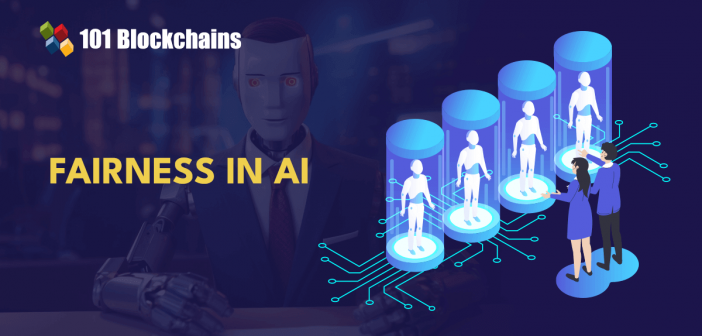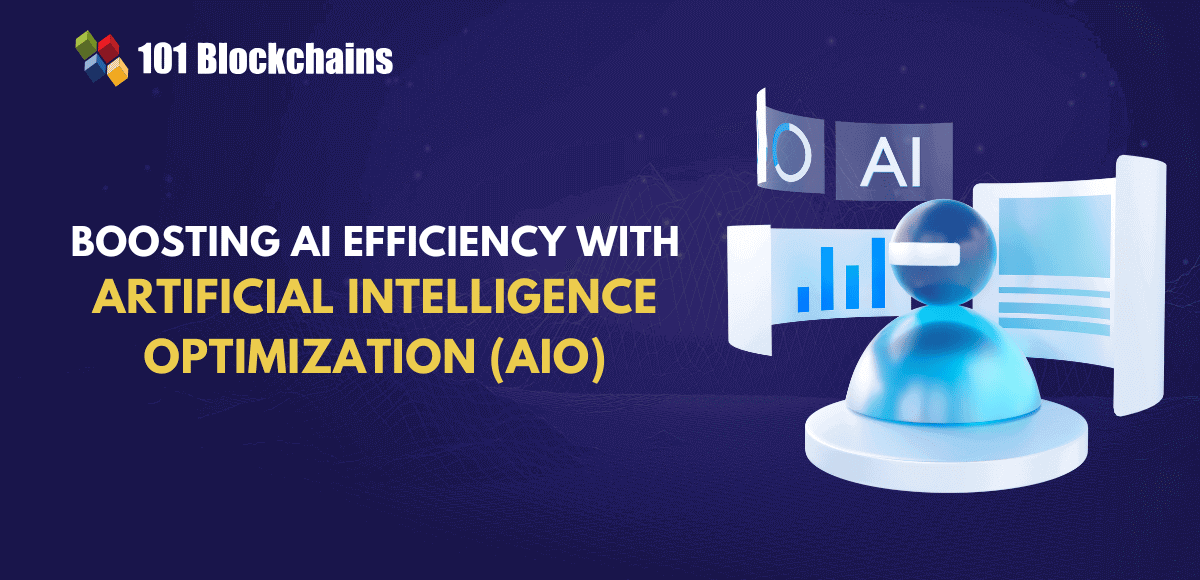Learn how blockchain truly works, master key definitions, and uncover what makes smart contracts so "smart." Dive into the fundamentals, gain valuable insights, and start your blockchain journey today!

- AI & ChatGPT
James Howell
- on January 24, 2024
The Importance of Fairness In AI
Artificial intelligence has become one of the integral components in the domain of technology. It has become an important part of our daily lives. Furthermore, AI also has a transformative impact on different industries, such as healthcare and finance. At the same time, it is important to reflect on fairness importance in AI to ensure responsible AI algorithm development. AI algorithms should not fall to the concerns emerging from bias in training data.
Bias could emerge in the form of systematic or unwanted discrimination against specific groups or individuals. You can come across problems due to bias in different stages of the AI lifecycle, such as data collection, pre-processing, designing algorithms, and making decisions. In addition, bias could also emerge from societal biases and historical discrepancies, which are completely unintentional in nature. Let us learn more about the importance of fairness in AI and machine learning.
What is Fairness in AI?
The world is gradually moving towards automation at unprecedented rates. The integration of AI and machine learning into everyday lives of people has led to formidable changes. For example, AI and machine learning serve as prominent tools for automating tasks, including university admissions and job application screenings.
Therefore, fairness in artificial intelligence has become a necessity in such tools and systems. Machine learning and AI algorithms that are not fair and do not follow ethical principles could be detrimental to users. For example, algorithms of social media sites have been considered responsible for increasing political tensions due to biased news feeds.
The definition of fairness in machine learning points to processes for correction and elimination of algorithmic bias from ML models. Fairness is a common term in the domain of artificial intelligence and machine learning. As a matter of fact, fairness is one of the important principles underlying the development of ethical and responsible AI.
However, fairness is a confusing concept for different reasons. The general definition of fairness suggests that it is the state or conviction for being fair. In other words, fairness focuses on ensuring impartial treatment of users. On the other hand, the meaning of fairness could be different for different people in different contexts.
Understand the importance of ethics and ethical frameworks in artificial intelligence with the Ethics Of Artificial Intelligence (AI) Course
How Does Fairness Look from Different Perspectives?
The ideal approach to understanding the responses to questions like “Why is fairness in artificial intelligence important?” would focus on understanding the true meaning of fairness. You can come across different definitions of fairness from the perspective of multiple disciplines. For example, fairness has unique definitions in law, philosophy, and social science. In addition, the definition of fairness also changes in the case of quantitative disciplines such as computer science, economics, mathematics, and statistics.
- In terms of law, fairness focuses on safeguarding individuals and groups from mistreatment or discrimination. Fairness in legal context emphasizes the prohibition of biases, behaviors, and decision-making according to certain social groups or protected factors.
- In terms of philosophy, fairness closely relates to anything which is morally right. For example, fairness in political philosophy relates to concepts of equity and justice.
- Fairness in social science accounts for social relationships and the power dynamics of different institutions and markets. In such cases, members of certain groups are more likely to have a position of advantage.
- The definition of fairness in quantitative disciplines can be perceived as mathematical problems where fairness should align with certain criteria for specific tasks.
You can notice the difficulty in defining fairness for different disciplines. Therefore, the definition of fairness in AI also takes multiple forms.
Understand the importance of chatbots, ChatGPT, and artificial intelligence with our ChatGPT Fundamentals Course.
Conventional Approach for Fairness in AI and Issues
AI researchers and experts seek fairness in AI examples to ensure the development of ethical and responsible AI systems. However, they tend to follow a quantitative perspective for viewing fairness. The quantitative approach emphasizes the development of an optimal ML model with fairness constraints, thereby representing a constrained optimization problem.
The constraints can be defined from the perspective of philosophy, law, and social science. Generally, constraints could revolve around notable sensitive and legally protected attributes. AI researchers believe that the model should offer optimal performance alongside ensuring fair treatment of users according to sensitive attributes.
On an individual level, the fairness importance in AI can be defined with approaches for similar treatment of similar individuals. In addition, fairness could also be defined at a group level by classifying people into different categories and ensuring equitable treatment of the groups. The simplest approach for ensuring fairness at the group level involves the use of demographic parity among different subgroups. Demographic parity ensures that membership in a protected class would not influence the decision of AI systems in any case.
However, the quantitative approach to ensuring fairness in artificial intelligence systems could present significant issues. First of all, the narrow specifications of such approaches could not capture the subtle nuances alongside different definitions of fairness. For example, demographic parity might serve as an effective solution for fairness in AI. However, it could showcase discrepancies with respect to other definitions of fairness. Furthermore, it is also important to look for parity in the allocation of resources by AI systems and the approaches they follow for allocating resources.
Identify the true full potential of generative AI in business use cases and become an expert in generative AI technologies with our Generative AI Skill Path.
Importance of Addressing Fairness in AI and Machine Learning
AI and machine learning are futuristic technologies that could change the traditional perspectives on how technology serves us. However, questions like “Why is fairness in artificial intelligence important?” invite attention to the potential challenges of AI and ML. Fairness is an important requirement in AI and ML as it helps in building responsible and ethical AI systems. Users are less likely to trust an AI system, which brings discrimination into the equation for delivering responses to queries. As a matter of fact, unintentional discrimination against certain individuals or groups in AI algorithms is one of the foremost reasons to focus on fairness in AI.
Machine learning and artificial intelligence have become embedded in systems and applications that help us shop online, listen to music, or apply for universities. AI and machine learning can help us streamline massive collections of data for extracting relevant recommendations according to personalized preferences. However, bias in the training data of AI algorithms could lead to unfair and discriminatory practices by AI systems.
Therefore, data scientists and ML experts must ensure fairness in machine learning algorithms by identifying potential biases. Artificial intelligence learns by example from humans and could also learn how to avoid bias by using the right training data. Another important reason to consider fairness in AI and machine learning is the adoption of AI in different industries. For example, AI systems support use cases in credit lending to the proceedings in criminal justice systems worldwide. Therefore, it is important to ensure ethical and fair AI systems to ensure that people actually trust AI algorithms for critical tasks.
Enroll in our Certified ChatGPT Professional Certification Course to master real-world use cases with hands-on training. Gain practical skills, enhance your AI expertise, and unlock the potential of ChatGPT in various professional settings.
Challenges in the Development of Fairness in AI
The general assumption about AI and ML systems is that they are ‘fair’ and do not follow discriminatory precedents for biased treatment towards certain groups. However, most of the definitions and perspectives on fairness are not considered in the initial stages of developing AI systems. However, the fairness importance in AI does not come into play with the consideration of different definitions of fairness.
Even if you have different definitions, it is difficult to find the right perspective on fairness for a specific AI system. In addition, you must also consider the different actors associated with the ML process, such as developing the dataset, algorithm development, and utilization of AI systems. Each process in the development of an AI system could assume different interpretations and perspectives on fairness.
One of the prominent examples of fairness in AI examples would point to the COMPAS algorithm. It helps judges in forecasting which criminals are most likely to become repeat offenders. The problem with the algorithm is that it followed a quantitative approach to ensure fairness. However, it also left room for interpreting the meaning of fairness in AI. Artificial intelligence systems not only provide a reflection for society but also replicate the same over time, which can lead to amplification of inequities.
In addition, another challenge for ensuring fairness in AI points to the lack of a clear explanation for the adoption of a specific definition or approach for fairness. Selection of one definition of fairness implies the existence of trade-offs that should be documented for understanding the rationale behind certain actions of the AI system.
You can also note some technical challenges for ensuring fairness in machine learning, such as opaqueness of machine learning models. In addition, the inclusion of different fairness constraints could create restrictions for an algorithm, thereby leading to lower accuracy. Furthermore, the use of AI systems also defines the implications of fairness. For example, an AI system could be classified as ‘unfair’ if users could not view, understand, and appeal against the actions or choices of the AI systems.
Learn the fundamentals of AI applications in businesses with AI For Business Course
How Can You Ensure Fairness in AI Algorithms?
The challenges for fairness in AI provide a clear impression of the obstacles you must navigate to create responsible AI. You can achieve fairness in artificial intelligence algorithms by following different best practices recommended by experts. Here are some of the trusted best practices for ensuring the creation of ethical and responsible artificial intelligence systems.
You should identify the vulnerabilities or inconsistencies in the public training datasets. In addition, you should also evaluate the possibilities of privacy violation in the functioning of AI algorithms.
AI researchers and practitioners must also emphasize on examination of the ability of an algorithm to influence human behavior. It can help in deciding whether the AI algorithm is biased, and you could develop relevant algorithmic methods for avoiding predictive bias.
Most importantly, you could also rely on tools for preventing and eliminating bias in artificial intelligence and machine learning algorithms.
Take your first step towards learning about artificial intelligence with all the definitions of important AI concepts and terms with simple AI Flashcards
What are the Top Tools for Ensuring Fairness in AI?
The review of responses to “Why is fairness in artificial intelligence important?” shows that fairness is important for encouraging the trust of users in AI systems. Interestingly, you can rely on certain quantitative and qualitative tools for navigating through the challenges of ensuring fairness in AI. You can utilize the tools for guidance alongside formalizing the processes involved in development and use of AI algorithms. Here are some of the important quantitative tools that can help you achieve fairness in AI.
-
AI Fairness 360 Toolkit by IBM
IBM offers the AI Fairness 360 Toolkit as an effective tool for incorporating fairness importance in AI algorithms with limited efforts. It is a Python toolkit that offers technical solutions for fairness with the help of metrics and algorithms. The toolkit helps in examining, reporting, and mitigating bias alongside concerns of discrimination in artificial intelligence models.
-
Fairlean.py by Microsoft
The fairlean.py by Microsoft is a Python package that helps in implementation of different algorithms for mitigating concerns of fairness in supervised machine learning algorithms.
-
What-If Tool by Google
Google has also come up with an exclusive solution for ensuring fairness in machine learning algorithms with the What-If tool. It works by exploring the performance of an AI model on a specific dataset with the examination of different predefined notions of fairness constraints, such as equality of opportunity. The What-If tool serves as a promising advantage for ensuring fairness in AI by allowing users to explore diverse definitions of fairness.
Interestingly, Facebook has also been working on a new internal tool, “Fairness Flow,” for detection of bias in machine learning models.
Want to learn about the fundamentals of AI and Fintech? Enroll now in the AI And Fintech Masterclass
Conclusion
The rise of artificial intelligence has created a new revolution in the domain of technology. However, it is important to address the concerns of fairness in artificial intelligence algorithms before considering the prospects for broader adoption of AI. The applications of AI in use cases such as criminal justice systems and credit lending systems imply the necessity of fair AI systems.
For example, AI-powered credit lending systems could discriminate against a specific group of people due to bias in the training dataset. Therefore, it is important to look for the ideal solutions to resolve these challenges, such as quantitative tools to resolve bias. Learn more about the value of ethical and responsible AI to ensure compliance with principles for fairness in AI right now.






